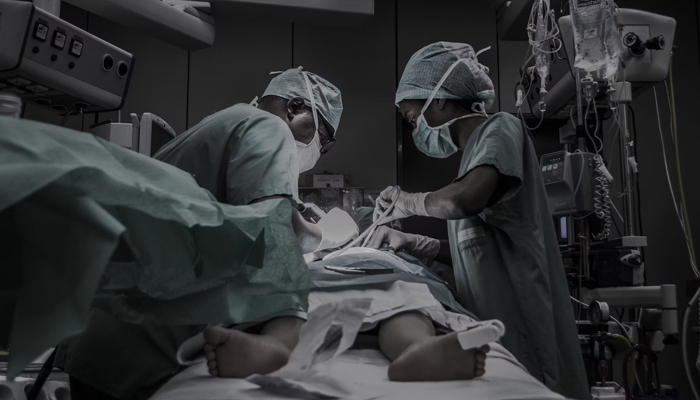Experts call for timely solution as 25,000 need kidney transplants annually
There is a severe shortage of renal transplant centres in Pakistan as there is an annual need for 20,000 to 25,000 kidney transplants, but country’s capacity is to perform only 1,000 to 1,500 transplants only, officials and transplant surgeons said on Monday.
“There is a need for finding a timely solution for thousands who are waiting for the kidney transplants as around 20,000 to 25,000 people need kidney transplants annually while hardly 1,000 to 1,500 transplants are performed in the country,” Prof Saeed Quraishy, vice chancellor, Dow University of Health Sciences (DUHS), told a symposium on renal transplants at a hotel in Karachi.
Experts from various fields, including Prof Lionel Rostaing from France, and Prof Syed Fazal Akhter, Prof Ejaz Ahmed, Dr Muhammad Mubarak, Dr Khawar Abbas, Prof M. H Osmani from the National Medical Centre, Karachi, Prof Abdul Mannan Junejo, Prof Salman Imtiaz, Dr Ashar Alam, Dr Sonia Yaqoob, Dr Mansoor Shah, Dr Faisal Mehmood, and Dr Aisha Hassan Memon, addressed the symposium.
Prof Saeed Quraishy maintained that there are misconceptions regarding organ donations in Pakistan, which are attributed to various reasons, including religious beliefs. He emphasized the need to encourage people to donate organs and raise awareness about preventive measures against kidney diseases.
“At Dow University, kidney, liver, and bone marrow transplantation services are ongoing, alongside the research in all the fields of medical sciences,” he said and urged the medical professionals to evaluate their accomplishments and challenges in the transplantation field.
He also emphasized the importance of upholding ethical standards to maintain a high level of care. Prof Rashid Bin Hamid, the head of the Renal Transplant Unit, stated that the success rate of kidney transplantation in the university is 90 percent, which is quite satisfactory.
Dr Tassaduq Khan reported that 570 kidney transplantations have been performed since the establishment of the Renal Transplant Unit in Karachi, with 557 being first-time recipients, 12 being second-time recipients, and only one patient receiving a third transplant.
He maintained that 51 percent of those who donate kidneys and accept transplants in Karachi are from Sindh, but 17 percent come from Punjab, 20 percent from Balochistan, and 2 percent from Afghanistan. Prof Amjad Sattar, the head of the interventional radiology department, highlighted the importance of radiology in the process of organ donation and transplantation, as it plays a vital role in the care and monitoring of both donors and recipients. He pointed out that radiology contributes significantly to the success of transplantation procedures.
Dr Faisal Mahmood from the Aga Khan University Hospital spoke of the widespread prevalence of TB in the Pakistani society, and highlighted the need to conduct TB risk assessments and initiate treatment for patients before kidney transplantation to minimize risks. Dr Khawar Abbasi from the SIUT discussed the significance of B-cell targeted therapy in renal transplantation.
-
 Royal Family's Approach To Deal With Andrew Finally Revealed
Royal Family's Approach To Deal With Andrew Finally Revealed -
 Super Bowl Weekend Deals Blow To 'Melania' Documentary's Box Office
Super Bowl Weekend Deals Blow To 'Melania' Documentary's Box Office -
 Meghan Markle Shares Glitzy Clips From Fifteen Percent Pledge Gala
Meghan Markle Shares Glitzy Clips From Fifteen Percent Pledge Gala -
 Melissa Jon Hart Explains Rare Reason Behind Not Revisting Old Roles
Melissa Jon Hart Explains Rare Reason Behind Not Revisting Old Roles -
 Meghan Markle Eyeing On ‘Queen’ As Ultimate Goal
Meghan Markle Eyeing On ‘Queen’ As Ultimate Goal -
 Japan Elects Takaichi As First Woman Prime Minister After Sweeping Vote
Japan Elects Takaichi As First Woman Prime Minister After Sweeping Vote -
 Kate Middleton Insists She Would Never Undermine Queen Camilla
Kate Middleton Insists She Would Never Undermine Queen Camilla -
 King Charles 'terrified' Andrew's Scandal Will End His Reign
King Charles 'terrified' Andrew's Scandal Will End His Reign -
 Winter Olympics 2026: Lindsey Vonn’s Olympic Comeback Ends In Devastating Downhill Crash
Winter Olympics 2026: Lindsey Vonn’s Olympic Comeback Ends In Devastating Downhill Crash -
 Adrien Brody Opens Up About His Football Fandom Amid '2026 Super Bowl'
Adrien Brody Opens Up About His Football Fandom Amid '2026 Super Bowl' -
 Barbra Streisand's Obsession With Cloning Revealed
Barbra Streisand's Obsession With Cloning Revealed -
 What Did Olivia Colman Tell Her Husband About Her Gender?
What Did Olivia Colman Tell Her Husband About Her Gender? -
 'We Were Deceived': Noam Chomsky's Wife Regrets Epstein Association
'We Were Deceived': Noam Chomsky's Wife Regrets Epstein Association -
 Patriots' WAGs Slam Cardi B Amid Plans For Super Bowl Party: She Is 'attention-seeker'
Patriots' WAGs Slam Cardi B Amid Plans For Super Bowl Party: She Is 'attention-seeker' -
 Martha Stewart On Surviving Rigorous Times Amid Upcoming Memoir Release
Martha Stewart On Surviving Rigorous Times Amid Upcoming Memoir Release -
 Prince Harry Seen As Crucial To Monarchy’s Future Amid Andrew, Fergie Scandal
Prince Harry Seen As Crucial To Monarchy’s Future Amid Andrew, Fergie Scandal




